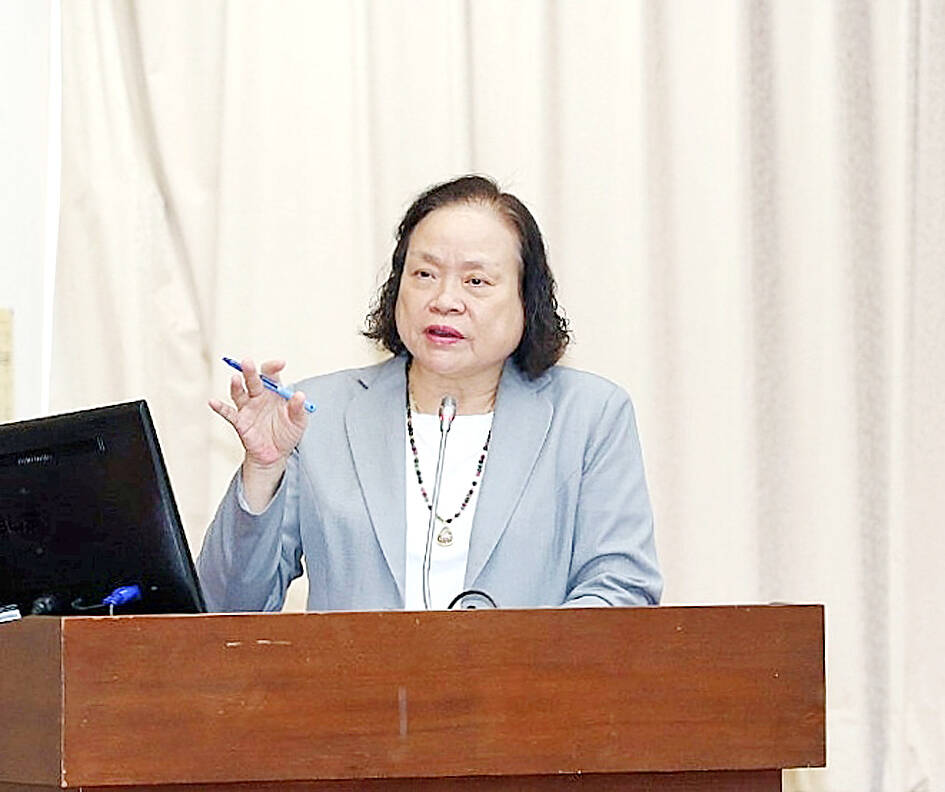The economy is expanding faster than expected and could grow about 5 percent this year, buoyed by robust exports driven by global demand for artificial intelligence (AI), the Directorate-General of Budget, Accounting and Statistics (DGBAS) said yesterday.
DGBAS Minister Chen Shu-tzu (陳淑姿) told lawmakers at a meeting of the Legislative Yuan’s Finance Committee that the government’s forecast of 4.45 percent growth for this year “might have been somewhat underestimated,” citing stronger-than-expected export momentum.
“There is indeed room for further upward adjustment, as exports have continued to perform,” Chen said. “The earlier forecast was likely conservative.”

Photo: CNA
The comments came after the Asian Development Bank raised its projection for Taiwan’s GDP growth to 5.1 percent, the strongest in the region.
The DGBAS upgraded its forecast in August from 3.1 percent to 4.45 percent, but it said later that the economy is tracking even higher.
Exports in the first nine months of the year rose 29.7 percent year-on-year to US$452.68 billion, exceeding the government’s projection by 7.4 percentage points. The surge underscores Taiwan’s growing role in the global AI supply chain, with strong demand for high-end semiconductors and electronics offsetting weakness in non-tech sectors.
Orders for chips and components used in AI infrastructure remain strong, dispelling earlier expectations that shipments would cool in the second half of the year due to decreasing front-loading, Chen said.
The traditional year-end peak season for technology goods should support the momentum, she added.
Major US technology companies have announced AI investment plans that promise continued opportunities for Taiwan’s leading chipmakers and component suppliers.
However, ongoing US-China tariff negotiations could weigh on Taiwan’s trade prospects in the longer term, Chen said.
“Tariffs would have an effect, but not in the second half of this year,” she said. “The economy is stable for now.”
Meanwhile, inflation pressures have continued to ease. The consumer price index (CPI) rose 1.25 percent last month, marking the fifth consecutive month below the central bank’s 2 percent alert level and the lowest reading in more than four years.
Still, households “continue to feel the pinch,” with increasing costs for fruit, rent, dining out and medical services, even as vegetable prices have stabilized, Chen said.
The government would continue to monitor price trends and provide policy support as needed, she added.
Separately, the IMF has raised its forecast for Taiwan’s economic growth this year to 3.7 percent, amid stronger-than-expected recovery momentum worldwide.
In its latest World Economic Outlook report released on Tuesday, the IMF projected Taiwan’s real GDP would grow 3.7 percent this year, up from 2.9 percent in its April forecast.
However, next year’s growth forecast was revised downward to 2.1 percent from 2.5 percent.
The report also estimated that Taiwan’s consumer price inflation would reach 1.7 percent this year, slightly below the April projection of 1.8 percent, and would remain stable at 1.6 percent next year.
Additional reporting by CNA

In Italy’s storied gold-making hubs, jewelers are reworking their designs to trim gold content as they race to blunt the effect of record prices and appeal to shoppers watching their budgets. Gold prices hit a record high on Thursday, surging near US$5,600 an ounce, more than double a year ago as geopolitical concerns and jitters over trade pushed investors toward the safe-haven asset. The rally is putting undue pressure on small artisans as they face mounting demands from customers, including international brands, to produce cheaper items, from signature pieces to wedding rings, according to interviews with four independent jewelers in Italy’s main

Japanese Prime Minister Sanae Takaichi has talked up the benefits of a weaker yen in a campaign speech, adopting a tone at odds with her finance ministry, which has refused to rule out any options to counter excessive foreign exchange volatility. Takaichi later softened her stance, saying she did not have a preference for the yen’s direction. “People say the weak yen is bad right now, but for export industries, it’s a major opportunity,” Takaichi said on Saturday at a rally for Liberal Democratic Party candidate Daishiro Yamagiwa in Kanagawa Prefecture ahead of a snap election on Sunday. “Whether it’s selling food or

CONCERNS: Tech companies investing in AI businesses that purchase their products have raised questions among investors that they are artificially propping up demand Nvidia Corp chief executive officer Jensen Huang (黃仁勳) on Saturday said that the company would be participating in OpenAI’s latest funding round, describing it as potentially “the largest investment we’ve ever made.” “We will invest a great deal of money,” Huang told reporters while visiting Taipei. “I believe in OpenAI. The work that they do is incredible. They’re one of the most consequential companies of our time.” Huang did not say exactly how much Nvidia might contribute, but described the investment as “huge.” “Let Sam announce how much he’s going to raise — it’s for him to decide,” Huang said, referring to OpenAI

The global server market is expected to grow 12.8 percent annually this year, with artificial intelligence (AI) servers projected to account for 16.5 percent, driven by continued investment in AI infrastructure by major cloud service providers (CSPs), market researcher TrendForce Corp (集邦科技) said yesterday. Global AI server shipments this year are expected to increase 28 percent year-on-year to more than 2.7 million units, driven by sustained demand from CSPs and government sovereign cloud projects, TrendForce analyst Frank Kung (龔明德) told the Taipei Times. Demand for GPU-based AI servers, including Nvidia Corp’s GB and Vera Rubin rack systems, is expected to remain high,